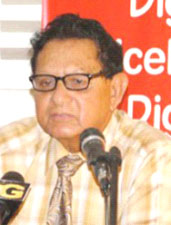Some 656 complaints were made against police officers during last year, according to Police Complaints Authority (PCA) Chairman retired Justice Cecil Kennard.
The figure represents a significant increase over the 430 complaints that were received in the preceding year.
Of those complaints, Kennard said 294 were made by citizens directly to the PCA, 358 through the police force’s Office of Professional Responsibility (OPR) and some four were received from the police force’s Criminal Investigation Department (CID).

Kennard told Stabroek News in an interview on Friday that apart from complaints which his office receives directly from citizens, the OPR and the CID are also sources from which the PCA receives reports.
The Chairman said that of the 294 cases reported directly to his office, “most have been fully investigated and matters concluded.” As for those engaging his attention from the OPR, the retired judge noted that all 358 of those cases have been dealt with.
The complaints received against police officers for last year included neglect of duties, unlawful arrest, illegal search, using unnecessary/excessive violence, corruption/taking bribes, speaking to members of the public in a harsh/hostile manner, acting in a manner likely to bring discredit to the reputation of the police force, being under the influence of alcohol and being improperly dressed while on duty.
Kennard said that his office received four shooting-death files in which he recommended that a murder charge be instituted against two police officers in one of those cases. He, however, noted that after making this recommendation, the Director of Public Prosecutions (DPP) advised that the two officers be charged with manslaughter instead.
He said that there were another three or four cases involving police shootings where no deaths resulted, for which he recommended that wounding charges be instituted against the officers in question.
Asked whether his recommendations are acted upon, Justice Kennard said that they “generally are.” He noted that there are sometimes variations between the charge he recommends and the charge that is laid by the DPP but he added that his recommendations that charges be instituted are generally acted upon.
Kennard, however, acknowledged that there are occasions where his recommendations may not be acted upon, but noted that these are generally rare occurrences. “Generally all my recommendations are acted upon,” he said.
Asked whether there are factors constraining the functions of the PCA, Kennard said there are a few, including the need for more independent investigators and its inability to achieve wider reach among citizens.
He said that while his clerical staff is adequate, there is need for at least two additional independent investigators to be better able to expedite investigations, given the increasing volume of cases engaging his office.
The retired judge lauded the work being done by the four investigators in his employ, but noted that another two would significantly boost the PCA’s capacity in ensuring thorough investigations.
On April 1 last year, four independent investigators were appointed to the PCA and they function under the direct supervision of the Chairman.
As regards the issue of reach, Kennard said that his office engages in outreach programmers throughout the country, but noted that this exercise is costly. He recommends that the office be decentralised to have at least one representative agent in each county.
He said that in addition to outreaches, brochures are usually distributed at regional democratic offices in every region as a means of raising awareness of the PCA among citizens.
Kennard, however, said that there is need for civil society, lawyers and all stakeholders to play a part in publicising the existence of the organisation to those who may not be aware.
Apart from those shortcomings, the Chairman said that he is able to execute his duties unhindered.
Asked to comment on whether he believes the OPR is an unbiased arm of the police force, since it has to essentially take reports of indiscretions against its own, the retired judge answered in the affirmative.
He said that irrespective of the files coming from the OPR, they all still have to be directly reviewed by him but he added that he finds the investigators there to be unbiased.
The mandate of the PCA is to receive and investigate complaints and recommend actions to be taken for both criminal and disciplinary breaches, which Justice Kennard said is being achieved.
It is the right of any aggrieved citizen who wishes to make a complaint against a member of the police force to do so to the PCA, which can be reached on telephone numbers 226-2095 or 226-1399. Additionally, written complaints can be forwarded to policecomplaintsauthority@yahoo.cowas established by the Police Complaints Authority Act 1989 (No. 9/1989) and came into being on December 29, 1989 by virtue of Order No. 4/1990. It started to function on January 2, 1990. It is an independent body.









